
WANT TO JOIN OUR INCREASED INCOME
REVOLUTION?
Our focus is on helping landlords get the most out of their properties,and increase cashflow by managing their properties on
their behalf as serviced apartments.
Here at Statera, we pride ourselves on being different. Being property investors ourselves, we understand the value of our client's investment in their properties and assets. This is why everything that we do is all about striking a balance - [Statera], creating win-win situations that will allow us to be satisfied with the returns on our service, while at the same time giving our landlords and investors more money
in their pockets than traditional agents can offer. Our landlords enjoy the benefit of having the piece of mind that their investment is being handled with the care and attention that it deserves.
"WE ARE PUTTING THE EARNINGS BACK INTO THE POCKETS OF LANDLORDS AND INVESTORS".
WHY HOMEOWNERS CHOOSE STATERA ESTATES
Statera Estate is a full service agency. This means once you start to work with us, we take over every single part of managing your property as a predictably profitable business, and you can be rest assured that your property is in great condition and maximising on it's potential. Your money will come into your bank account monthly and on time, all without you having to invest any of your precious time
.

EARN AND LEARN
Landlords who work with us,
will not only have thepotential to benefit from an increased cashflow , but theywill also get tolearn the process, andshould they decide they want to do it alone in the future,they will be equipped to do so

TIME FREEDOM
More profits generally means more work, but here's the reality that we're all to familiar with, most Landlords did not get into property to create a second job for themselves. Marketing, managing bookings, handling the cleaners and maintenance team as well as guest communication are some of the things we take away from you, giving you back your time freedom.

OUR EXPERTISE
Not everyone knows how to transform their property into a proper business. You can leverage our expertise in how to understand if there is demand for serviced apartments in your location,how to attract guests on a consistent basis to maximise your income potential, and then finally how to manage the whole process
LEGISLATIVE BENEFITS
EPC 2025
With over 3 million homes falling short of the new epc standard from 2025 (costing them on average £8000), it's no wonder many landlords are now coming to us to help them get around this by using our serviced accommodation model
Section 21
With the rising inflation and the cost of living increase, landlords can not afford for their tenants to miss payments, and to make matters worse, it is taking an average of 12 months to evict tenants at the moment. We can help you avoid this with our serviced accommodation model
Section 24
Want to save on tax? Even if you're not registered as a limited company?Another reason our landlords are overjoyed with us. Get in touch to see how we can do the same for you.
TAX BENEFITS
Capital Gains Tax Reliefs
The good news about having a SA is you can claim a range of tax reliefs that are usually reserved for traders. These include Entrepreneur’s Relief, Hold Over Relief, Relief for Gifts of Business Assets, Relief for Loans to Traders and Roll Over Relief.
Capital Allowances
As the owner of a Serviced apartment, you are allowed to claim Capital Allowance for items such as equipment, household fixtures and furniture. This means that if you decide to go to town with decorating and furnishing your SA, you will be able to deduct these costs from your pre-tax profits.
Pension Contribution
Any profit that you make from your SA is considered as ‘relevant earnings’ which means you can make tax-advantaged pension contributions.
Council Tax or Business Rates
Serviced apartments do not pay council tax. As the owner of a SA you should register for business rates, which will be calculated by your local council. In general, these rates will be lower than council tax.
BTL vs SA
Increased profits
Typically, the same property will generate 2/3x more profit for the landlord or investor, opening many more options for them.
No more nonpaying tenants
With a BTL, you have a contract in place that if the tenant breaks, it takes about 12 months to actually evict them. As a Serviced Accommodation provider, you have no tenants but instead you have guests that pay you even before they arrive.
Property in pristine condition at all times
Due to the nature of the business, Serviced Accommodation properties have to be kept in pristine condition at all times, whilst it's difficult to predict what your property will look like at the end of a tenancy, generally, you will be planning for the worst
More control
Our landlords have full control of their property, many of them for the first time in years. With our services, you decide when it's occupied and when you want to keep it available for yourself, whether that is to host family, guests, it doesn't matter what you need it for, the fact is it is in your complete control with the utmost flexibility to use your asset to it's best advantage.
WHERE DO WE LIST YOUR PROPERTY
OUR PARTNERS:





HOW IT WORKS
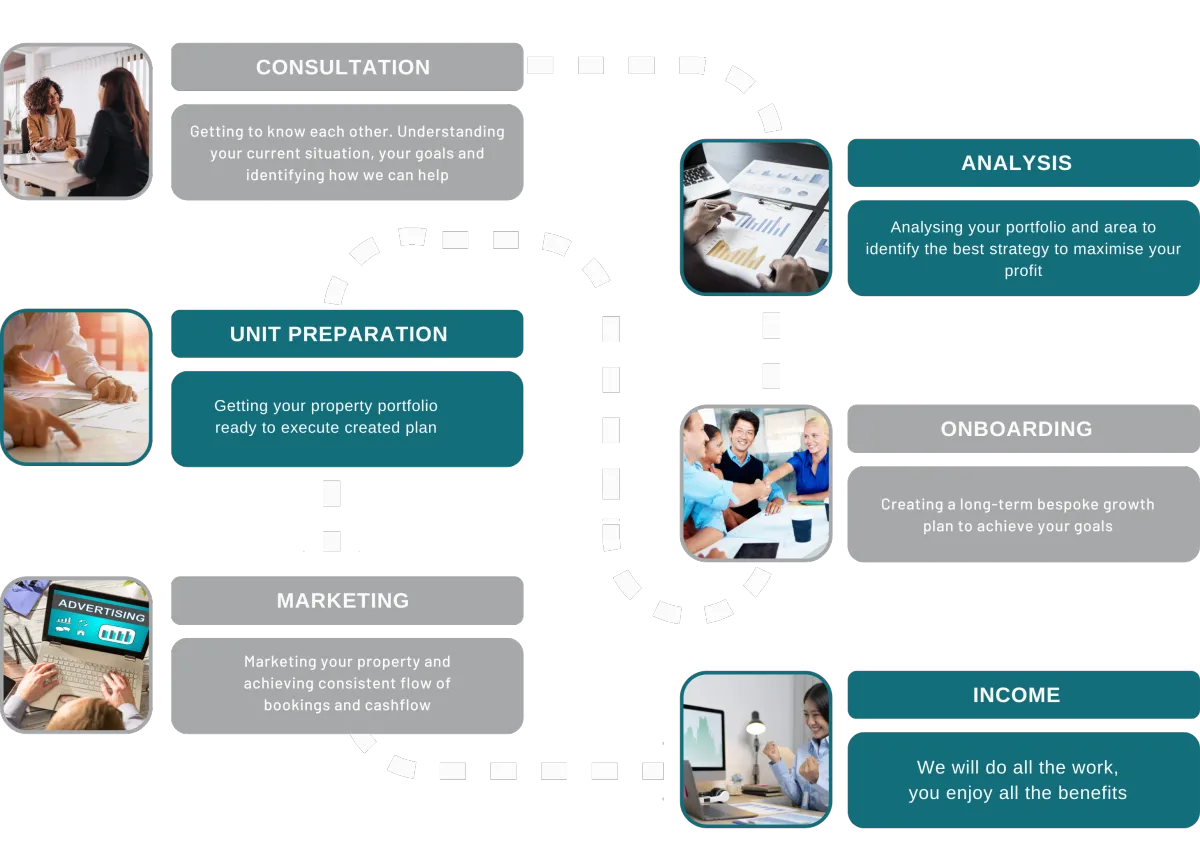
LISTING MANAGEMENT
Optimised for maximum returns.
Maximising occupancy
We'll offer your property on a variety of sites to maximise your booking and revenue potential. Your calendar is synchronised across all of them thanks to our technology, and you get fantastic returns. To assure occupancy all year long, we also concentrate on the corporate market.
Professional photography
With expert photography, we'll raise your occupancy rate and the amount you may charge.
Listing creation and optimisation
We'll set up and create your listings on several platforms in order to improve the amount of reservations and assist attract the correct visitors to your home. Since we have years of experience, we are aware of what is most effective.
Profit growth
We focus on helping you enhance your property's income by effectively pricing it and taking advantage of periods of strong demand. We have both the data and the excellent human ideas that are the foundation of every successful pricing plan.
GUEST MANAGEMENT
Ensuring a 5-star guest stay.
Guest vetting
Your safety and the security of your property are our top priority. We screen all guests.
Check-in and smart-locks
Easy self check-in is a top priority for guests and the Airbnb algorithm loves it too! So we support you through out smart-lock installation process and provide software that will not only to provide guest with easy check in option but also will increase security for your property.
Linen and toiletries
Guests always remember how good the sheets are! We provide hotel quality linen and a high-quality laundry service. Our housekeepers know all the perfect touches for an enjoyable guest stay.
Guest communication
Responding to guests as quickly as possible is the key to getting more bookings and maintaining a good reputation. Our teams respond 24/7/365 and trained to deal with all questions and issues both before and during stays.
PROPERTY MANAGEMENT
Taking care of your property.
Cleaning and housekeeping
5-star Cleans from our Professional Housekeepers. We've work with Airbnb cleaning service providers that are tried and tested with time, to ensure every clean is done thoroughly with guests in mind and are never missed! Cleaners even report back to HQ with photos.
Maintenance
Our housekeeping team take photographs between each guest stay and report on any maintenance items. If it's a small item, we'll fix it quickly. If it's something that needs repairing or replacing, such as washing machine, we can arrange this for you.
Deposits
We take security deposits from all guests for every booking. This protects our downside and keeps the guests accountable.
Reports
Our Dashboard syncs your calendar between multiple booking websites to give you more control and see who is staying. You can also track your performance and income. Clear and transparent.
MAKE YOUR FIRST STEP TO ACHIEVING YOUR FINANCIAL GOALS
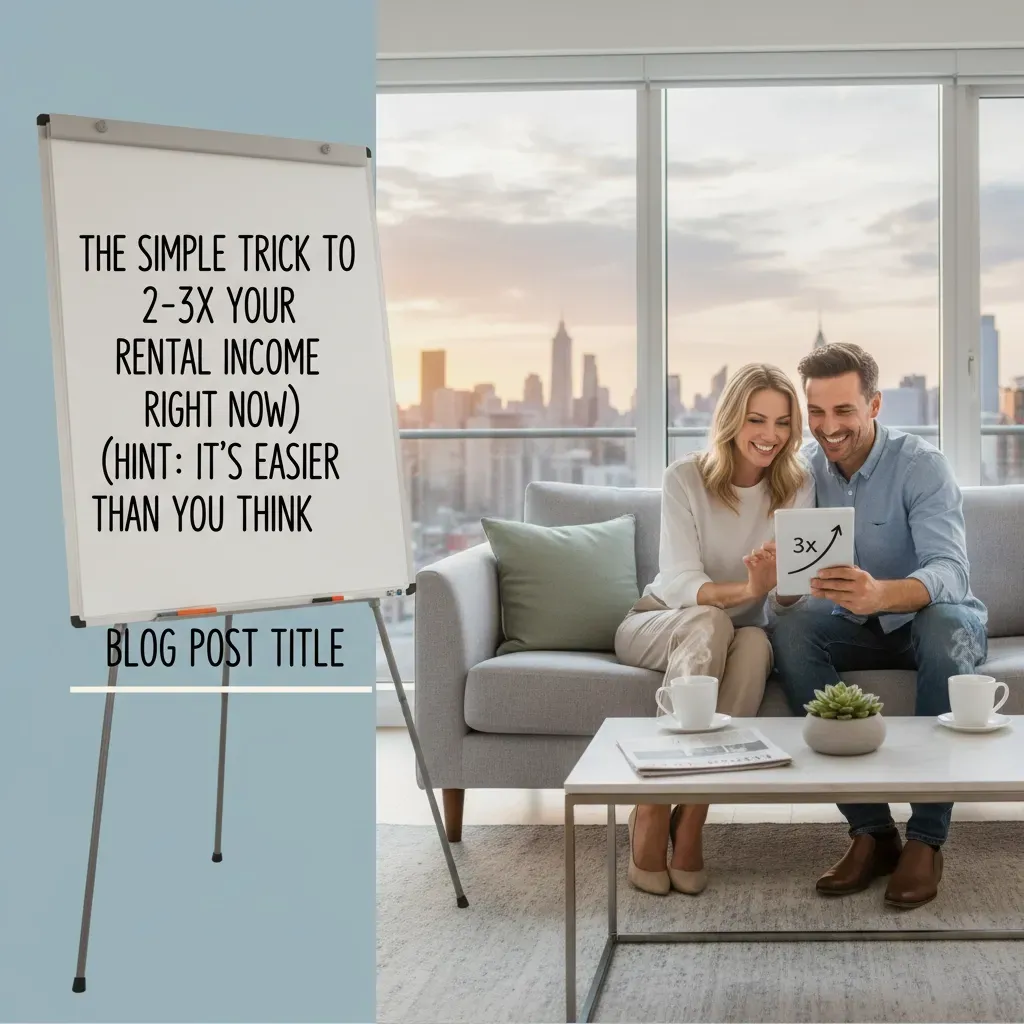
The Simple Trick to 2-3x Your Rental Income Right Now (Hint: It's Easier Than You Think)
If you're stuck watching your rental income crawl upward by 3-5% annually while your expenses seem to jump much faster, you're not alone. Traditional long-term rentals have become a slow-growth game where landlords wait years to see meaningful returns. But there's a shift happening that smart property owners are capitalising on right now: and it's delivering income increases of 200-300% almost overnight.
The trick? Converting your traditional rental property into a short-term let. And before you think "that sounds complicated," hear us out: it's far easier than most landlords imagine, especially when you have the right support system.
Why Traditional Rentals Are Leaving Money on the Table
Let's start with some real numbers. A typical two-bedroom flat in Manchester might rent for £1,200 per month through traditional letting. That same property, optimised for short-term guests, can easily generate £120-180 per night. Even at 60% occupancy (which is conservative for a well-managed Airbnb), you're looking at £2,160-3,240 monthly: that's a 180-270% increase.
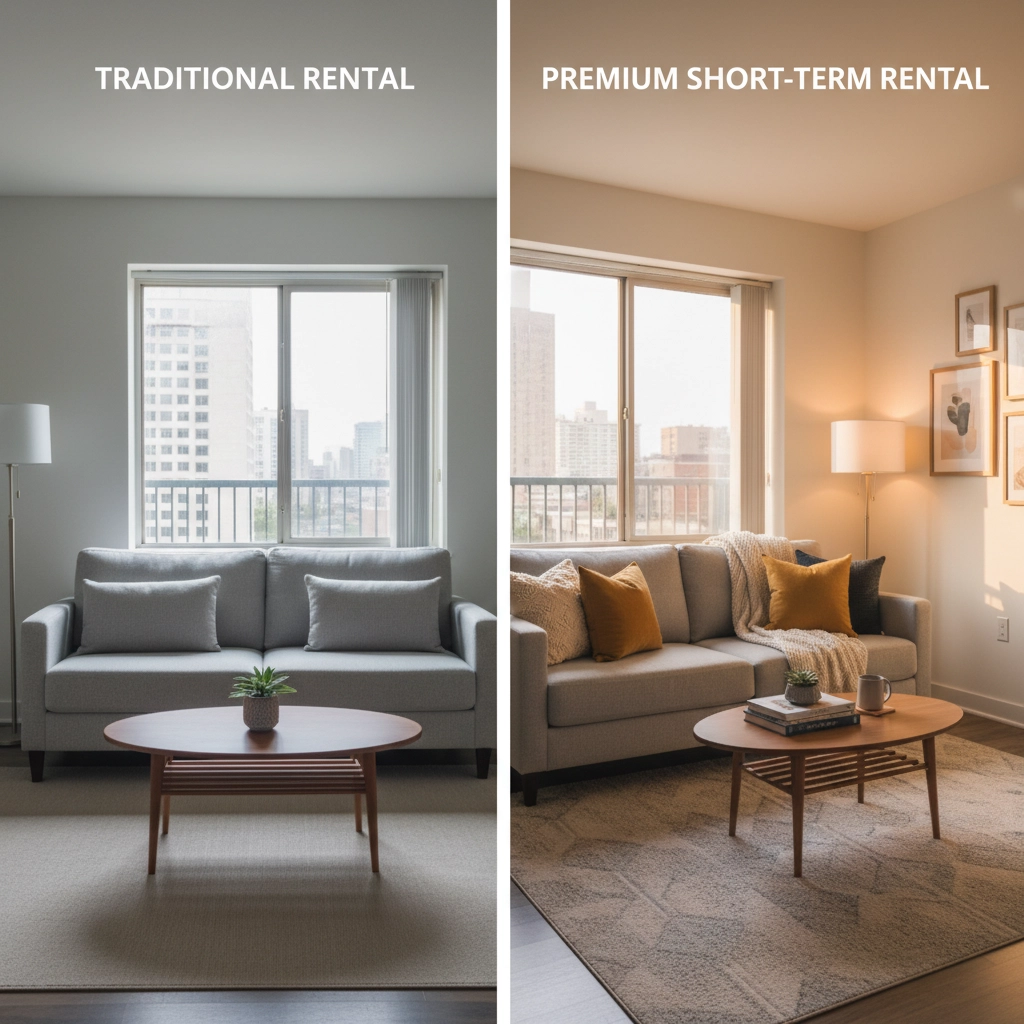
The maths becomes even more compelling in popular areas. Properties in city centres, near universities, or close to business districts often see occupancy rates of 70-80% when properly managed. We've seen landlords who were earning £15,000 annually from traditional rentals suddenly bringing in £35,000-45,000 from the same property.
But here's what most landlords don't realise: the biggest barrier isn't the concept itself: it's the execution. Managing short-term rentals effectively requires a different skill set, more time, and specific knowledge about pricing, guest communication, and property optimisation. That's exactly why most landlords never make the switch, even when they know it would boost their income.
The Short-Term Rental Advantage Goes Beyond Higher Nightly Rates
While the income potential is the obvious draw, short-term rentals offer several advantages that traditional lettings simply can't match:
Flexibility and Control: With traditional tenants, you're locked into year-long agreements with minimal control over your property. Short-term rentals give you the flexibility to use your property personally, adjust pricing based on demand, and make improvements between bookings.
Reduced Wear and Tear: Guests typically stay 2-7 days, meaning less daily wear on appliances and fixtures. Plus, professional cleaning between each stay keeps your property in excellent condition.
Premium Positioning: Short-term rentals allow you to position your property as a premium experience rather than basic accommodation. Guests expect and pay for quality, which justifies higher-end furnishing and amenities that command top rates.
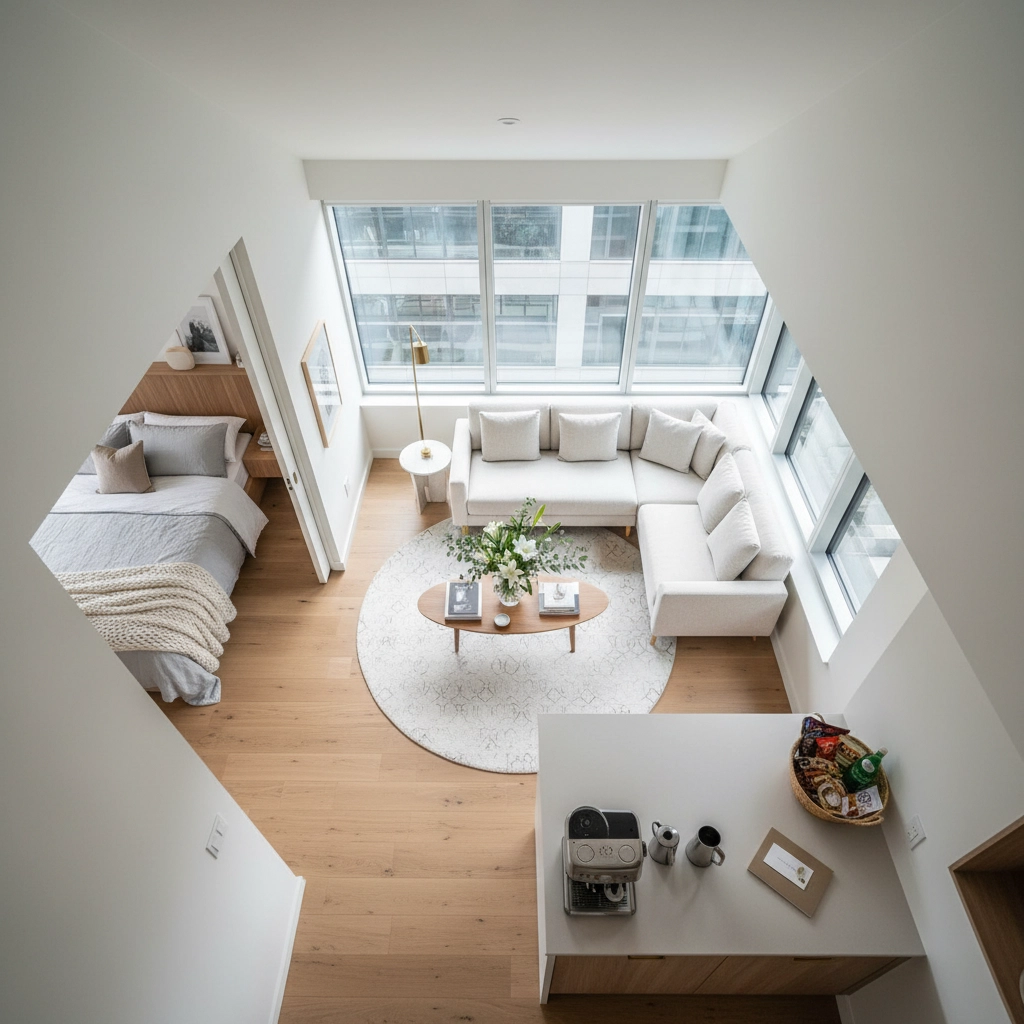
Market Responsiveness: Unlike fixed rental agreements, you can immediately adjust pricing for local events, seasonal demand, or market changes. Christmas markets, conferences, concerts: every local event becomes a revenue opportunity.
Why Most Landlords Don't Make the Switch (And How to Overcome These Barriers)
Despite the clear financial benefits, many landlords stick with traditional rentals because they're worried about:
Time Management: Managing bookings, coordinating cleaners, handling guest communications, and maintaining listings across multiple platforms can feel overwhelming.
Setup Complexity: Getting properties guest-ready with proper furnishing, amenities, and professional photography requires upfront investment and expertise.
Regulatory Concerns: Understanding local regulations, licensing requirements, and tax implications can seem daunting.
Guest Issues: Dealing with difficult guests, damage, or noise complaints feels riskier than having stable long-term tenants.
These concerns are valid, but they're also completely manageable with the right approach. The key is having systems and expertise in place to handle these challenges professionally.
The Complete Transition Process (Simpler Than You Think)
Converting from traditional to short-term rental doesn't require you to become an Airbnb expert overnight. Here's how the process typically works:
Property Assessment and Optimisation: The first step involves evaluating your property's short-term rental potential. This includes analysing local demand, competition, and identifying necessary improvements. Many properties need minimal changes: fresh paint, quality linens, and basic amenities often suffice.
Professional Setup: This covers everything from creating compelling listings with professional photography to setting up pricing strategies that maximise revenue. The listing description, amenities list, and house rules all impact booking rates and guest quality.

Operational Management: Day-to-day operations include managing bookings across multiple platforms, coordinating cleaning and maintenance, handling guest communications, and dealing with any issues that arise.
Performance Optimisation: Ongoing success requires monitoring occupancy rates, adjusting pricing strategies, updating listings based on guest feedback, and staying compliant with evolving regulations.
The reality is that each of these steps requires specific expertise and significant time investment. Most successful short-term rental owners either develop these skills over months of trial and error or partner with specialists who already have the systems in place.
Real Results from Real Landlords
Consider Sarah, who owned a three-bedroom house in Birmingham that was renting for £1,400 monthly. After transitioning to short-term rentals, she now averages £3,800 monthly: a 271% increase. The property consistently books 22-25 nights per month at an average of £165 per night.
Or take James, whose Leeds apartment was generating £950 monthly through traditional letting. As a short-term rental, the same property now brings in £2,400-2,800 monthly, depending on the season. During Leeds Festival and other major events, nightly rates jump to £200-250.
These aren't exceptional cases: they represent typical results when properties are properly optimised and professionally managed.
The Professional Management Advantage
The difference between successful and struggling short-term rentals often comes down to management quality. Professional Airbnb management companies bring several crucial advantages:
Established Systems: Proven processes for guest communication, cleaning coordination, maintenance scheduling, and issue resolution that have been refined over hundreds of bookings.
Market Expertise: Deep knowledge of local demand patterns, optimal pricing strategies, and competitive positioning that maximises both occupancy and rates.
Platform Relationships: Established presence across multiple booking platforms with the reviews and rankings that drive visibility and bookings.
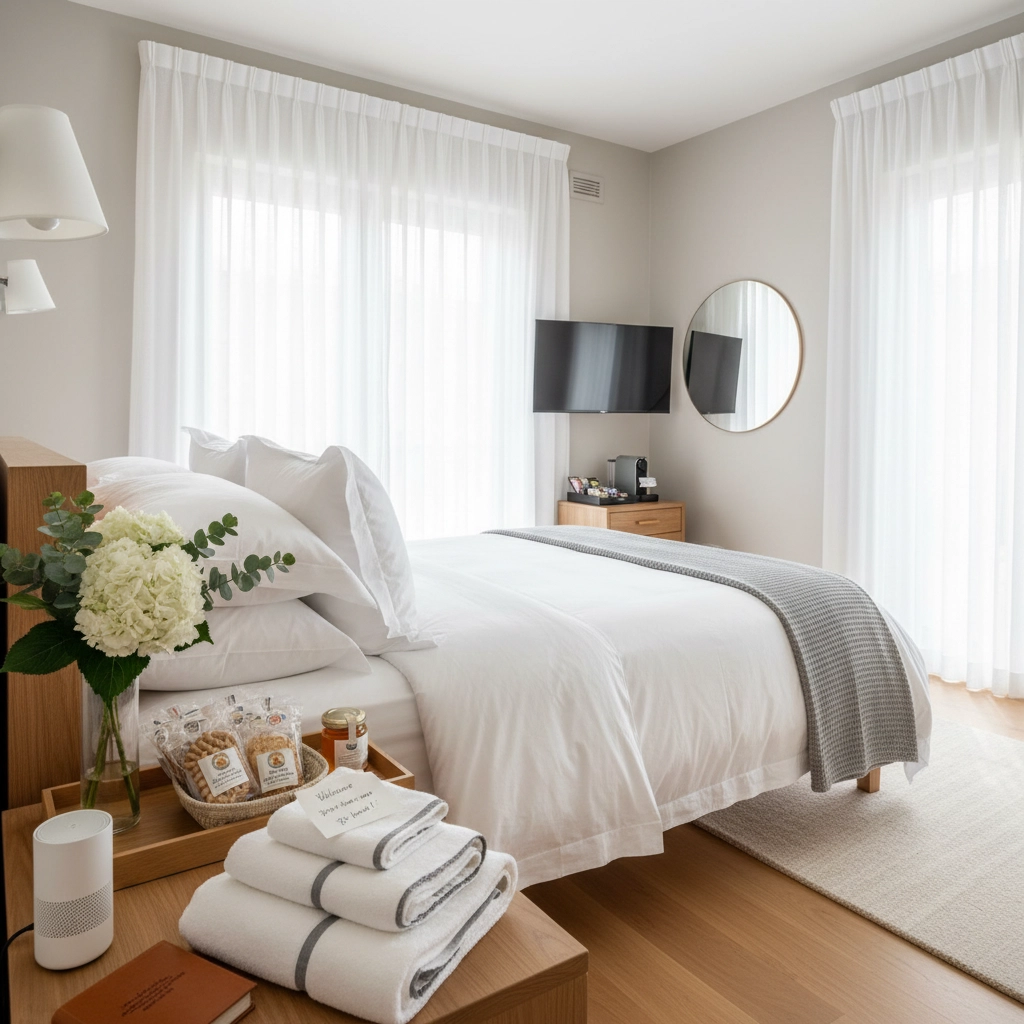
Regulatory Compliance: Up-to-date knowledge of local regulations, licensing requirements, and tax obligations that protect landlords from costly mistakes.
Time Savings: Complete handling of day-to-day operations, allowing landlords to enjoy increased income without increased workload.
Making the Transition Work for You
The key to successfully transitioning from traditional to short-term rentals isn't just recognising the opportunity: it's having the right strategy and support system. Many landlords get excited about the income potential but underestimate the operational complexity. Others get overwhelmed by the perceived complexity and never take action.
The smart approach is finding a middle ground: partnering with specialists who can handle the complex operational aspects while you maintain ownership and enjoy the increased returns. This allows you to capture the financial benefits without the steep learning curve or ongoing time commitment.
Whether you're earning £800 monthly from a studio flat or £2,000 from a family home, the same multiplication factor applies. The question isn't whether short-term rentals can increase your income: it's whether you're ready to make the switch and how you want to manage the transition.
The opportunity is real, the demand is there, and the systems exist to make it work. The only question is whether you'll take advantage of it or watch other landlords capture the income that could be yours.
Ready to explore what your property could earn as a short-term rental? Visit our website to discover your property's income potential and learn how we make the transition seamless for landlords across the UK.
HERE
HIM DECIDING TO GO FOR A
TRADITIONAL RENTAL VS USING OUR SERVICES
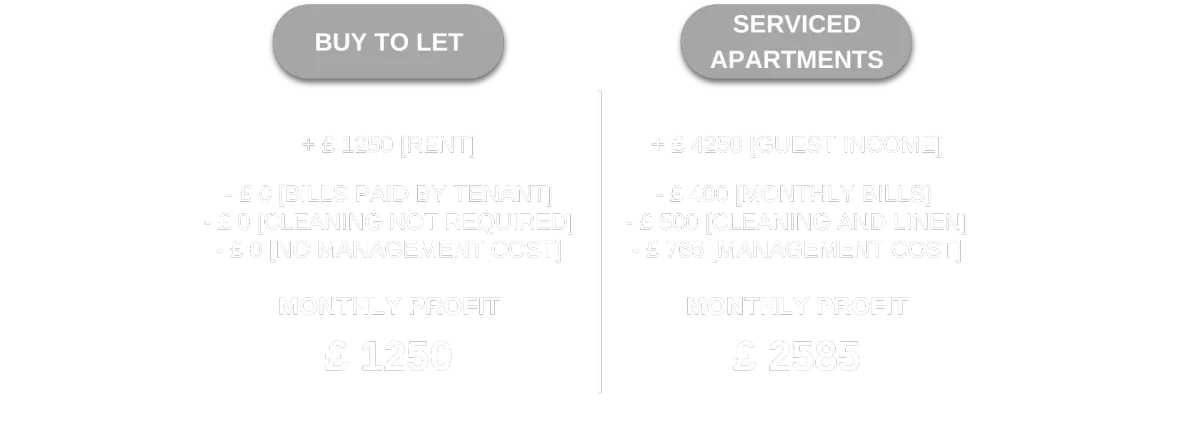
90%
Occupancy rate
2X
Profit comparing to BTL
9.5
Excellent on Booking.com

Godwin
"Before I came across Statera Estates I had this property vacant for 2 years. I was starting to get frustrated and was thinking about selling because I did not want to go back to dealing with regular tenants. If someone had told me 2 years ago that I could make more than double the profits on this property and not having to deal with tenants, I would have never believed them, but that is exactly what has happened. My property is looking the best it ever has, always book booked out and I never have to ask any questions because I have my own portal which allows me to see exactly what is happening at any given point. I could not recommend this company highly enough!"
USEFUL TO KNOW

Lots of landlords are unaware of the potential to increase the income they generate from their properties. So much so that a whole new income strategy has come out of this lack of knowledge, called rent-to-rent.
This is where landlords are offered guaranteed rent for a fixed term, this could be anywhere from 12 - 60 months, the landlord then allows the service provider to sublet the property, which they then turn into serviced apartments. In theory, there are benefits to the landlord, as they no longer have to worry about void periods, management, evictions etc. The difference between what the service provider
rents the property from the landlord for, and what they are able to get on the open market, is theirs to keep as profit
.
AT STATERA ESTATES, WE BELIEVE THERE IS A BETTER WAY!
Having worked with many investors, we understand the landlords journey, the sacrifices they have made to put themselves on the ladder, and as such we believe it is unfair that so many property investors and landlords are missing out on the opportunity to maximise on the investment that they’ve worked very hard to attain, while others are often times making more money from their properties than they are as landlords and investors.
GET THE MOST OUT OF YOUR PROPERTY
INCREASE YOUR CASHFLOW
MORE TIME, WE MANAGE IT FOR YOU
CUTTING OUT THE MIDDLEMAN
LEGISLATION AND TAX BENEFITS
We decided that we will focus on helping landlords get the most out of their properties and increase cash flow by managing their properties on their behalf as serviced apartments, and in the process, cutting out the middleman. This puts the control back into their hands as they are now able to benefit from all the legislation that doesn't apply to using your property as a serviced apartment.
WANT TO JOIN OUR INCREASED INCOME REVOLUTION?
TERMS &
CONDITIONS
PRIVACY POLICY




Statera Estates Management LTD is a company incorporated in England and Wales with registered number 16829215 and registered offices at 321-323 High Road, Chadwell Heath, Romford, Essex, RM6 6AX, United Kingdom.
Statera Estates LTD is registered with the Information Commissioner’s Office, with registration number ZB361736
Statera Estates LTD is a member of The Property Ombudsman Scheme, with membership No. T08031.




